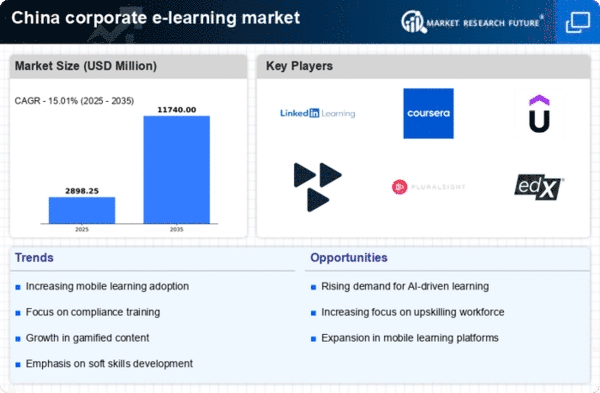Expansion of Remote Work Culture
The shift towards remote work has significantly influenced the corporate e-learning market in China. As more companies adopt flexible work arrangements, the need for effective online training solutions has become paramount. Data suggests that approximately 50% of organizations in China have implemented remote work policies, necessitating the development of e-learning programs that cater to a dispersed workforce. This trend has prompted e-learning providers to enhance their platforms, ensuring they are accessible and user-friendly for remote employees. The expansion of remote work culture not only drives the demand for e-learning solutions but also encourages organizations to invest in comprehensive training programs that can be delivered online, thereby propelling growth in the corporate e-learning market.
Increased Focus on Compliance Training
Compliance training has emerged as a critical component within the corporate e-learning market in China. With the rise of regulatory requirements across various sectors, organizations are compelled to ensure that their employees are well-versed in compliance protocols. It is estimated that around 60% of companies in China prioritize compliance training as part of their e-learning initiatives. This focus not only mitigates legal risks but also enhances corporate governance. As a result, e-learning platforms are increasingly incorporating compliance modules that are interactive and engaging, ensuring that employees grasp essential regulations effectively. The growing emphasis on compliance training is likely to drive the corporate e-learning market, as organizations seek to maintain adherence to laws and standards.
Growing Demand for Workforce Upskilling
The corporate e-learning market in China is experiencing a notable surge in demand for workforce upskilling. As industries evolve, companies recognize the necessity of equipping employees with new skills to remain competitive. Reports indicate that approximately 70% of organizations in China are investing in training programs to enhance employee capabilities. This trend is driven by the rapid technological advancements and the need for a skilled workforce. Consequently, the The corporate e-learning market is adapting to provide tailored solutions. that address specific skill gaps, thereby fostering a culture of continuous learning within organizations. The emphasis on upskilling not only enhances employee performance but also contributes to overall organizational growth, making it a pivotal driver in the corporate e-learning market.
Emphasis on Data-Driven Learning Solutions
The corporate e-learning market in China is increasingly characterized by an emphasis on data-driven learning solutions. Organizations are recognizing the value of utilizing data analytics to assess training effectiveness and employee performance. It is estimated that around 40% of companies in China are now employing data analytics to tailor their e-learning programs. This approach allows organizations to identify skill gaps, monitor progress, and adjust training content accordingly. By leveraging data-driven insights, companies can enhance the relevance and impact of their training initiatives. This trend towards data-driven learning solutions is likely to propel the corporate e-learning market, as organizations seek to optimize their training strategies and improve overall workforce competency.
Rising Investment in Learning Technologies
Investment in learning technologies is a significant driver of the corporate e-learning market in China. Organizations are increasingly allocating budgets towards advanced e-learning tools and platforms to enhance training effectiveness. Recent statistics indicate that spending on learning technologies has grown by approximately 25% in the past year alone. This investment is aimed at integrating innovative features such as gamification, analytics, and adaptive learning into e-learning programs. By leveraging these technologies, companies can create more engaging and personalized learning experiences for their employees. The rising investment in learning technologies not only improves training outcomes but also positions organizations to better meet the evolving demands of the workforce, thereby fueling the corporate e-learning market.
















